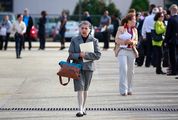Onward march of the robots
by Tim Harford,
2015-11-04 06:00:31.0
ARE WE nearing a dramatic moment in economic history? Before humans developed agriculture, the world population (and thus the world economy) doubled in size roughly every 250,000 years. After agriculture came about, the world economy doubled in size every 900 years.
After the Industrial Revolution growth accelerated again, and since the Second World War, the world economy has been doubling in size about every 15 years. These numbers have been collated by Robin Hanson of George Mason University in Virginia, and are based on educated guesses by economic historians.
Another step-change of a similar scale would double the size of the world economy between now and Christmas. That is hard to imagine, but a band of believers predict an economic "singularity". Hanson is one of them, and computer scientist Ray Kurzweil, author of The Singularity Is Near, is perhaps the most famous.
The singularity would be a point at which new technologies would develop themselves — at a rate far beyond our comprehension. Our civilisation would be in the hands of cyborgs, genetically enhanced superbeings or something able to make itself smarter at a tremendous rate. The idea that the economy might double in size every few weeks no longer seems quite so unimaginable.
But it is one thing to imagine such a future. It is another thing to have confidence that it is approaching. Many economists point out that productivity growth has been sluggish for a long time, which hardly seems to be a precursor to a transformative economic take-off. Growth in advanced economies, far from accelerating, seems to require extraordinary stimulus to prevent it from stopping altogether.
Other economists are more bullish, reminding us of a basic fact about the rapid exponential growth in computing power: if it continues, then by definition growth in the future will dwarf growth in the past.
William Nordhaus of Yale University has published a research paper that aims to adjudicate on this debate. He proposes a series of tests to detect an imminent singularity, looking for evidence that either the forces of production or the goods we consume are being transformed by computing.
His first test is on the demand side. Is it likely that singularity-prone products such as games, films and computers will eventually absorb most of our spending? The answer seems to be no. The proportion of spending on such products is falling because their price is collapsing. If this trend continues, limitless digital goods will be the intricate icing on a stodgy economic cake. Our economy will move at the pace of the slowest sectors, and we will be chained to productivity improvements in mundane products such as food, shelter and transportation. After all, we can’t eat smartphone apps. Perhaps, instead, computing will revolutionise how we produce these mundane products. An obvious second test, then, is to ask whether US productivity is accelerating. It isn’t.
Other tests look at the importance of investment goods in the economy. If the singularity is approaching, one might expect them to become very cheap and dominate economic output. Are the average prices of investment goods (which include computers and software, and buildings and machinery) falling relative to wages at an accelerating rate? The answer is no. What of the stock of capital relative to US economic output — is it rapidly rising? No.
So far, there is not much sign of a singularity in the data. But a couple of tests do point in that direction. The share of US national income accruing to capital rather than labour is rising, albeit at a modest pace, as one might expect as robots march into human affairs. And within the capital stock, the share of information assets such as software is increasing, although it is still only 6% or 7% of the total. Nordhaus argues that these two tests suggest a singularity is many decades away; his other tests all point in the wrong direction entirely.
The pro-singularity crowd might complain that conventional economic statistics do a poor job of measuring new products and services. A cellphone, for example, comes bundled with free products — a flashlight, satnav, an alarm clock and much more.
All this Mr Nordhaus acknowledges — he is a leading authority on measuring the value of goods that conventional statistics miss. He ponders back-of-the-envelope measures such as the time people spend consuming digital goods such as e-mail. But none of these efforts suggests anything transformative yet.
Perhaps this is complacency. In the movies, the robot takeover tends to be a sudden one. Perhaps cyborgs have kidnapped the real William Nordhaus and are using his name to spread disinformation. It is more likely, though, that the singularity is not near.
© Financial Times Limited 2015

CYBORG BIKER: Yamaha’s prototype model of a motorcycle-riding robot at the Tokyo Motor Show this week. Picture: REUTERS/ISSI KATO
ARE WE nearing a dramatic moment in economic history? Before humans developed agriculture, the world population (and thus the world economy) doubled in size roughly every 250,000 years. After agriculture came about, the world economy doubled in size every 900 years.
After the Industrial Revolution growth accelerated again, and since the Second World War, the world economy has been doubling in size about every 15 years. These numbers have been collated by Robin Hanson of George Mason University in Virginia, and are based on educated guesses by economic historians.
Another step-change of a similar scale would double the size of the world economy between now and Christmas. That is hard to imagine, but a band of believers predict an economic "singularity". Hanson is one of them, and computer scientist Ray Kurzweil, author of The Singularity Is Near, is perhaps the most famous.
The singularity would be a point at which new technologies would develop themselves — at a rate far beyond our comprehension. Our civilisation would be in the hands of cyborgs, genetically enhanced superbeings or something able to make itself smarter at a tremendous rate. The idea that the economy might double in size every few weeks no longer seems quite so unimaginable.
But it is one thing to imagine such a future. It is another thing to have confidence that it is approaching. Many economists point out that productivity growth has been sluggish for a long time, which hardly seems to be a precursor to a transformative economic take-off. Growth in advanced economies, far from accelerating, seems to require extraordinary stimulus to prevent it from stopping altogether.
Other economists are more bullish, reminding us of a basic fact about the rapid exponential growth in computing power: if it continues, then by definition growth in the future will dwarf growth in the past.
William Nordhaus of Yale University has published a research paper that aims to adjudicate on this debate. He proposes a series of tests to detect an imminent singularity, looking for evidence that either the forces of production or the goods we consume are being transformed by computing.
His first test is on the demand side. Is it likely that singularity-prone products such as games, films and computers will eventually absorb most of our spending? The answer seems to be no. The proportion of spending on such products is falling because their price is collapsing. If this trend continues, limitless digital goods will be the intricate icing on a stodgy economic cake. Our economy will move at the pace of the slowest sectors, and we will be chained to productivity improvements in mundane products such as food, shelter and transportation. After all, we can’t eat smartphone apps. Perhaps, instead, computing will revolutionise how we produce these mundane products. An obvious second test, then, is to ask whether US productivity is accelerating. It isn’t.
Other tests look at the importance of investment goods in the economy. If the singularity is approaching, one might expect them to become very cheap and dominate economic output. Are the average prices of investment goods (which include computers and software, and buildings and machinery) falling relative to wages at an accelerating rate? The answer is no. What of the stock of capital relative to US economic output — is it rapidly rising? No.
So far, there is not much sign of a singularity in the data. But a couple of tests do point in that direction. The share of US national income accruing to capital rather than labour is rising, albeit at a modest pace, as one might expect as robots march into human affairs. And within the capital stock, the share of information assets such as software is increasing, although it is still only 6% or 7% of the total. Nordhaus argues that these two tests suggest a singularity is many decades away; his other tests all point in the wrong direction entirely.
The pro-singularity crowd might complain that conventional economic statistics do a poor job of measuring new products and services. A cellphone, for example, comes bundled with free products — a flashlight, satnav, an alarm clock and much more.
All this Mr Nordhaus acknowledges — he is a leading authority on measuring the value of goods that conventional statistics miss. He ponders back-of-the-envelope measures such as the time people spend consuming digital goods such as e-mail. But none of these efforts suggests anything transformative yet.
Perhaps this is complacency. In the movies, the robot takeover tends to be a sudden one. Perhaps cyborgs have kidnapped the real William Nordhaus and are using his name to spread disinformation. It is more likely, though, that the singularity is not near.
© Financial Times Limited 2015




























Change: -2.05%
Change: -2.09%
Change: -1.71%
Change: -1.64%
Change: -5.74%
Data supplied by Profile Data
Change: -0.17%
Change: 0.26%
Change: -2.05%
Change: 0.00%
Change: -0.15%
Data supplied by Profile Data
Change: 1.89%
Change: 0.88%
Change: 0.64%
Change: 0.70%
Change: 0.60%
Data supplied by Profile Data
Change: -1.42%
Change: -1.03%
Change: -1.54%
Change: 2.02%
Change: -1.04%
Data supplied by Profile Data